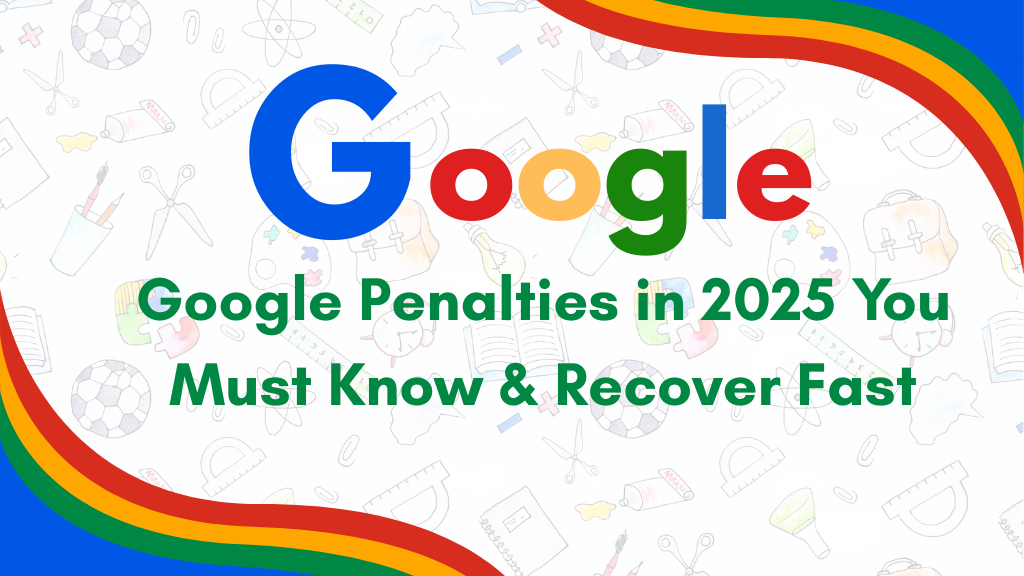


Tejhaksh Technologies is the Website designing & Digital Marketing company based in Neemuch, established in 2020 providing Website design, Website development, Logo design, Domain Registration, Web hosting, Android App Development, eCommerce web development, Search Engine Optimization, Bulk SMS etc. We have good experience in developing different platform websites and we keep our eye on the latest technologies to implement on the website for better conversion and user experience.

Google Penalties in 2025 still exist, but they’re now more sophisticated and precise than ever before. Google’s focus is no longer just on rankings, but also on user experience, content quality, and E-E-A-T (Experience, Expertise, Authoritativeness), and Trustworthiness.
When people search for something online, Google works hard to provide them with the best answers. To keep its search results useful and reliable, Google regularly updates its algorithms and takes strict action against websites that try to cheat the system by using unfair or “black-hat” SEO tricks.
If you run a website, it’s important to understand how to rank above your competitors in Google search results. You should stay informed about the latest SEO trends and techniques – but it’s equally important to know about Google penalties that can harm your website’s ranking and how to avoid them.
Here, we’ll explain what is a Google penalties, analyze the top 7 Google penalties in 2025, explain their causes, how to identify them, and how to fix them.
A Google Penalty is a punishment given to websites that violate Google’s rules or attempt to manipulate search rankings. These penalties typically occur when a website uses unethical or spammy SEO practices—such as keyword stuffing, fake backlinks, copied content, or other tactics that go against Google’s Search Essentials and spam policies.
When a website is penalized, its rankings can drop significantly—or in extreme cases, the site may disappear from Google’s search results altogether.
Let’s learn about the most common Google penalties so you can avoid them. If your website has already been penalized, this section is also useful for you as it provides information on how to recover from a Google penalty.
Let’s explore the 7 biggest Google penalties in 2025 you need to know and how to recover from them quickly:
A manual penalty occurs when a Google reviewer (through the Manual Actions team) believes that your site has violated Webmaster Guidelines—for example, by receiving a large number of unnatural or spammy inbound links.
These links may originate from paid link networks, link farms, irrelevant sites, useless directories, or other manipulative tactics.
Backlinks are still a fundamental part of Google’s ranking system. Having unnatural links can significantly reduce your domain’s trust in Google, leading to a ranking drop or delisting. Recovering from a manual link-related penalty is complicated because you must not only remove the links but also file a reconsideration request.
Less discussed, but just as damaging: Your outbound links (links you provide) can cause problems if your site is found to be linking to low-quality, spammy, or irrelevant domains solely for manipulation. While manual penalties typically target inbound links, algorithmic filters can detect unnatural outbound link patterns.
When your site acts as a “link farm” or you participate in link exchanges or paid link schemes, Google may consider your site part of a spam network—damaging both your outbound reputation and your rankings.
Another common manual action type: hidden text, overstuffed keywords, cloaking (showing users different content than the search engine), doorway pages, or other deceptive strategies that aim to manipulate Google’s rankings rather than help users.
Google’s guidelines emphasize user experience and relevance. When a site uses strategies that try to fool Google, it risks losing a manual action, rich snippets, or being removed from the index altogether.
Hint: You Might Receive This Penalty
By 2025, Google is placing even greater emphasis on user experience: mobile-first indexing, Core Web Vitals (loading speed, interactivity, visual stability), Safe Browsing, HTTPS, and no intrusive interstitials. Sites that don’t meet these standards may face algorithmic ranking drops.
Even if you have excellent content and solid links, poor UX signals can lower your rankings. Users abandoning quickly, a high bounce rate, slow loading—all of these tell Google that the site is less valuable to users, and therefore it may be placed lower in results.
Hint: You Might Receive this Penalty
Rich results (e.g., review stars, recipe markup, FAQ markup) can increase visibility in SERPs. However, if you misuse structured data (e.g., fake reviews, mismatched markup, markup hidden from users, misleading content), Google may take manual action.
Misuse of structured data undermines search credibility and user trust. If Google penalizes rich snippets on your site, your visibility may decrease, and you may lose advanced listing features.
In recent years (including 2024-25), Google has tightened its enforcement regarding “site reputation abuse” (sometimes also called “parasitic SEO”) – where a trusted and ranking website publishes low-value third-party content or hosts pages that are primarily SEO-driven rather than user-driven.
This behavior can trigger algorithmic demotion or manual action, depending on the severity.
Users expect that if they visit a particular site, the content should be consistent with the site’s theme, quality, and user expectations. If that trust is abused, Google can penalize the site’s broader ecosystem – meaning that even high-quality content could suffer.
Hint: You Could Receive This Penalty
Ignoring penalties or delaying recovery can lead to long-term damage:
Google Penalty in 2025 algorithms and manual reviewers will be more sophisticated than ever. They’ll focus on user experience, content quality, site credibility, relevance, and technical performance. If your site employs outdated SEO tactics, prioritizes rankings over user value, or creates manipulated links/content rather than merit, you’re playing a risky game.
But the good news is, with the right information and immediate action, you can recover. By understanding the seven major penalties listed above, staying vigilant, regularly auditing, promptly addressing issues, and consistently investing in quality content and user experience, you can protect your site’s visibility, traffic, and business success.
Leave a Comment